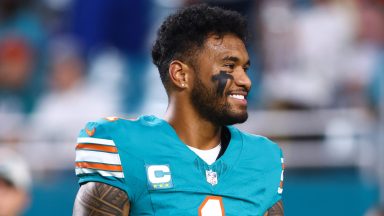
Since being selected with the No. 5 overall pick in the 2020 NFL Draft, former Alabama quarterback Tua Tagovailoa has experienced an uneven start to his career but appeared to flourish under coach Mike McDaniel in 2022. The 26-year-old demonstrated the potential to be Miami’s first franchise quarterback since Dan Marino.
However, just two games into the 2024 season, his career is now in question. Tagovailoa sustained a concussion during Miami’s loss to the Buffalo Bills on Thursday, prompting discussions about whether he should consider retirement.
Here’s everything we know about how the topic of retirement impacts his contract and what the rest of his season with the team might look like.
A Look Inside Tagovailoa’s Contract
This offseason, Dolphins general manager Chris Grier rewarded Tagovailoa’s improvements with a four-year, $212.4 million contract extension. Of this, $167.1 million is guaranteed, with approximately $42 million already paid out this year.
According to Michael Ginnitti of Spotrac, if Tagovailoa is cleared to play but opts to retire, he would forfeit the remaining $124 million unless he negotiates a settlement to recover it. However, if he is forced to retire due to medical reasons, he would be entitled to that $124 million.
Ginnitti noted on X, “The other side of this equation gets a little tougher. If Tua passes a physical next March, the Dolphins could release him, with only his $50 million of 2025 compensation remaining on the books.”
He added that the $54 million the Dolphins owe Tagovailoa for 2026 will become guaranteed on March 14. Releasing him after June would result in $83.6 million in dead cap over the final two years of his contract.
Ginnitti commented, “My assumption is that players want to play. It’s all they’ve done in life to date. Despite this being the fourth major head injury, I would guess that Tua will be cleared by next March. This situation puts pressure on the Dolphins to either move forward (knowing that another $54 million will become guaranteed) or release him. Another option could be renegotiating the contract to provide the team with more protection if Tua wants to continue his career.”
Has Tagovailoa Considered Retirement?
Last year, Tagovailoa revealed to reporters that he had considered retiring after experiencing a series of concussions in 2022.
“I considered it for a time, having sat down with my family, having sat down with my wife and having those kinds of conversations,” he said. “But, really, it would be hard for me to walk away from this game. With how old I am; with my son — I always dreamed of playing as long as I could, to where my son knew exactly what he was watching his dad do.”
Tagovailoa added, “It’s my health. It’s my body. I feel like this is what’s best for me and my family. I love the game of football. If I didn’t, I would have quit a long time ago.”
Has Anyone Else Experienced a Similar Situation?
Ginnitti told Front Office Sports that no player with a contract like Tagovailoa’s has faced a situation quite like this before. The closest comparison is Andrew Luck, who retired rather than signing a substantial new deal but still walked away with over $16 million from the Colts.
Luck, the former quarterback for the Indianapolis Colts, retired from the NFL unexpectedly in August 2019. His decision came after dealing with a series of injuries and setbacks over the years, including a particularly troublesome calf-ankle injury that had plagued him during the 2018 season and lingered into 2019.
Upon his retirement, Luck walked away from a substantial amount of money. However, his decision—driven by the physical and emotional toll of constant rehabilitation and injuries—sparked discussions about player health, the pressures of professional sports, and the broader mental and physical challenges athletes face.




